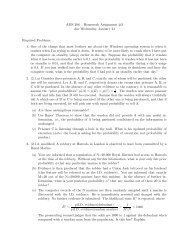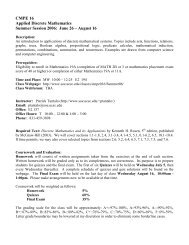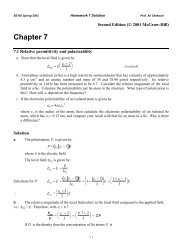The Esterel v5 21 System Manual - Courses
The Esterel v5 21 System Manual - Courses
The Esterel v5 21 System Manual - Courses
Create successful ePaper yourself
Turn your PDF publications into a flip-book with our unique Google optimized e-Paper software.
3.3. C CODE FOR DATA HANDLING 39<br />
Remark: It is convenient to write the string conversion functions<br />
together with the other data-handling functions. <strong>The</strong>ir definitions<br />
can be enclosed in a “#ifdef SIMUL” directive, making<br />
them defined only in simulation mode.<br />
3.3.5 Constants<br />
Each constant used in the <strong>Esterel</strong> program must be defined in C with the<br />
same name, unless it is initialized in the <strong>Esterel</strong> code. A constant can<br />
be defined either by a #define directive in prog.h or by a standard C<br />
variable definition. If not #defined, a constant is automatically declared to<br />
be extern in prog.c. It can therefore be defined in any other file. Consider<br />
the example:<br />
constant NUMBER_OF_PERSONS: integer,<br />
LUNCH_TIME: TIME;<br />
<strong>The</strong>n prog.h can contain<br />
#define NUMBER_OF_PERSONS 45<br />
and prog data.c can contain:<br />
TIME LUNCH_TIME = {12, 0, 0};<br />
3.3.6 Functions<br />
Each function used in the <strong>Esterel</strong> program must have a C definition. <strong>The</strong><br />
definition can be given either by a #define directive in prog.h or by a classical<br />
C function definition. If not #defined, the C function is automatically<br />
declared to be extern in the generated file prog.c.<br />
A C function definition must match the source function type declaration.<br />
For example, let us define the function declared in the PROG module by the<br />
following <strong>Esterel</strong> declaration:<br />
function FETCH (ARRAY_10_OF_TIME, integer) : TIME;<br />
A possible definition is:<br />
TIME FETCH (a, i)<br />
ARRAY_10_OF_TIME a;<br />
int i;<br />
{<br />
return(a.array[i]);<br />
}

















